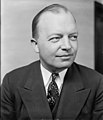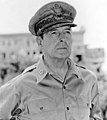
Wendell Lewis Willkie was an American lawyer, corporate executive and the 1940 Republican nominee for president. Willkie appealed to many convention delegates as the Republican field's only interventionist: although the U.S. remained neutral prior to Pearl Harbor, he favored greater U.S. involvement in World War II to support Britain and other Allies. His Democratic opponent, incumbent President Franklin D. Roosevelt, won the 1940 election with about 55% of the popular vote and took the electoral college vote by a wide margin.

The 1944 United States presidential election was the 40th quadrennial presidential election. It was held on Tuesday, November 7, 1944. The election took place during World War II, which ended the following year. Incumbent Democratic President Franklin D. Roosevelt defeated Republican Thomas E. Dewey to win an unprecedented fourth term. It was also the fifth presidential election in which both major party candidates were registered in the same home state; the others have been in 1860, 1904, 1920, 1940, and 2016. This was the last election until 1996 that saw the reelection of an incumbent Democratic president.
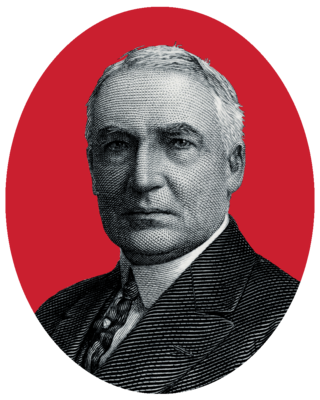
The 1920 Republican National Convention nominated Ohio Senator Warren G. Harding for president and Massachusetts Governor Calvin Coolidge for vice president. The convention was held in Chicago, Illinois, at the Chicago Coliseum from June 8 to June 12, 1920, with 940 delegates. Under convention rules, a majority plus one, or at least 471 of the 940 delegates, was necessary for a nomination.

The 1952 Republican National Convention was held at the International Amphitheatre in Chicago, Illinois from July 7 to 11, 1952, and nominated the popular general and war hero Dwight D. Eisenhower of New York, nicknamed "Ike", for president and the anti-communist crusading Senator from California, Richard M. Nixon, for vice president.
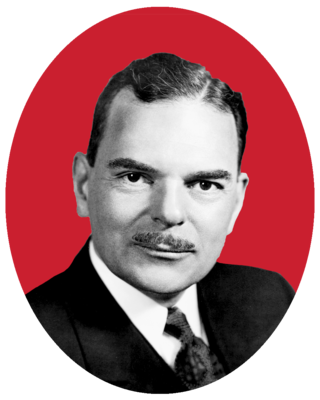
The 1948 Republican National Convention was held at the Municipal Auditorium, in Philadelphia, Pennsylvania, from June 21 to 25, 1948.
The America First Party was an isolationist political party which was founded on January 10, 1943. Its leader, Gerald L. K. Smith, was the party's presidential candidate in the 1944 U.S. presidential election.

The 1952 Democratic National Convention was held at the International Amphitheatre in Chicago, Illinois from July 21 to July 26, 1952, which was the same arena the Republicans had gathered in a few weeks earlier for their national convention from July 7 to July 11, 1952. Four major candidates sought the presidential nomination: U.S. Senator Estes Kefauver of Tennessee, Governor Adlai Stevenson II of Illinois, Senator Richard Russell of Georgia and Averell Harriman of New York.

The 1960 Republican National Convention was held in Chicago, Illinois, from July 25 to July 28, 1960, at the International Amphitheatre. It was the 14th and most recent time overall that Chicago hosted the Republican National Convention, more times than any other city.
The 1932 Democratic National Convention was held in Chicago, Illinois June 27 – July 2, 1932. The convention resulted in the nomination of Governor Franklin D. Roosevelt of New York for president and Speaker of the House John N. Garner from Texas for vice president. Beulah Rebecca Hooks Hannah Tingley was a member of the Democratic National Committee and Chair of the Democratic Party of Florida. She seconded the nomination of Franklin Delano Roosevelt, becoming the second woman to address a Democratic National Convention.
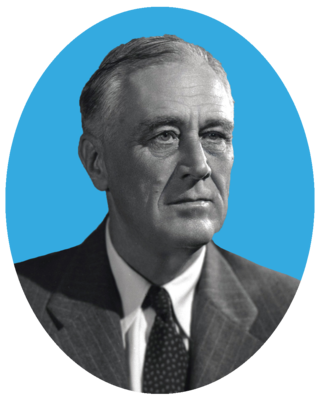
The 1944 Democratic National Convention was held at the Chicago Stadium in Chicago, Illinois from July 19 to July 21, 1944. The convention resulted in the nomination of President Franklin D. Roosevelt for an unprecedented fourth term. Senator Harry S. Truman of Missouri was nominated for vice president. Including Roosevelt's nomination for the vice-presidency in 1920, it was the fifth time Roosevelt had been nominated on a national ticket. The keynote address was given by Governor Robert S. Kerr of Oklahoma, in which he "gave tribute to Roosevelt's war leadership and new deal policies."
The 1940 Republican National Convention was held in Philadelphia, Pennsylvania, from June 24 to June 28, 1940. It nominated Wendell Willkie of New York for president and Senator Charles McNary of Oregon for vice president.

The 1936 Republican National Convention was held June 9–12 at the Public Auditorium in Cleveland, Ohio. It nominated Governor Alfred Landon of Kansas for president and Frank Knox of Illinois for vice president.

The 1932 Republican National Convention was held at Chicago Stadium in Chicago, Illinois, from June 14 to June 16, 1932. It nominated President Herbert Hoover and Vice President Charles Curtis for reelection.
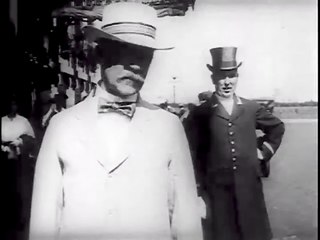
The 1916 Republican National Convention was held in Chicago from June 7 to June 10. A major goal of the party's bosses at the convention was to heal the bitter split within the party that had occurred in the 1912 presidential campaign. In that year, Theodore Roosevelt bolted the GOP and formed his own political party, the Progressive Party, which contained most of the GOP's liberals. William Howard Taft, the incumbent president, won the nomination of the regular Republican Party. This split in the GOP ranks divided the Republican vote and led to the election of Democrat Woodrow Wilson.
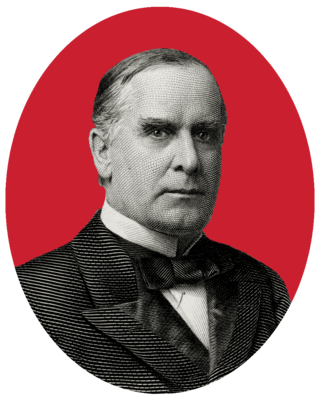
The 1900 Republican National Convention was held June 19 to June 21 in the Exposition Auditorium, Philadelphia, Pennsylvania. The Exposition Auditorium was located south of the University of Pennsylvania, and the later Convention Hall was constructed along the building's east wall. It was demolished in 2006.

From March 12 to May 17, 1940, voters of the Republican Party chose delegates to nominate a candidate for president at the 1940 Republican National Convention. The nominee was selected at the convention in Philadelphia, Pennsylvania from June 24–28, 1940.

The 1888 Republican National Convention was a presidential nominating convention held at the Auditorium Building in Chicago, Illinois, on June 19–25, 1888. It resulted in the nomination of former Senator Benjamin Harrison of Indiana for president and Levi P. Morton of New York, a former Representative and Minister to France, for vice president. During the convention, Frederick Douglass was invited to speak and became the first African-American to have his name put forward for a presidential nomination in a major party's roll call vote; he received one vote from Kentucky on the fourth ballot.
The 1884 Democratic National Convention was held July 8–11, 1884 and chose Governor Grover Cleveland of New York their presidential nominee with the former Governor Thomas A. Hendricks of Indiana as the vice presidential nominee.

From March 14 to June 11, 1944, voters of the Republican Party selected delegates to the 1944 Republican National Convention for the purpose of selecting their nominee for president in the 1944 election at the 1944 Republican National Convention held from June 26 to June 28, 1944, in Chicago, Illinois.




